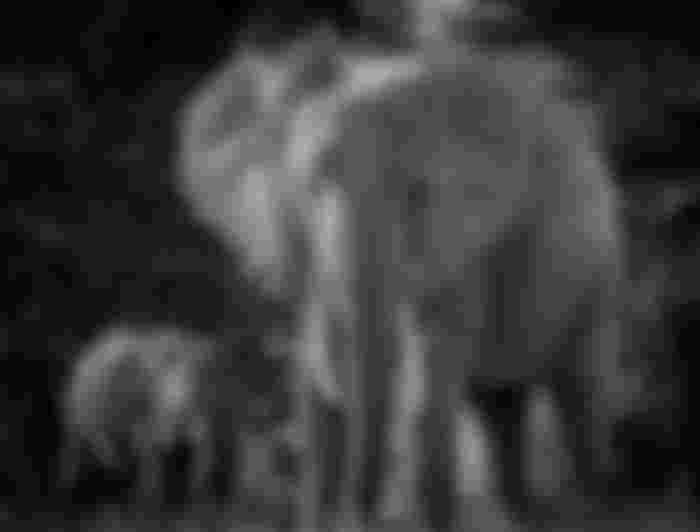African elephants are the largest land animals on planet Earth. They are slightly bigger than their Asian elephant cousins and can be identified by their larger ears that look somewhat like the continent of Africa while Asian elephants have smaller, rounded ears.

Although they were long grouped together as one species, scientists have determined that there are actually 2 species of African elephants (and both are at risk of extinction).
Savanna elephants are larger animals that roam the plains of sub-Saharan Africa, while forest elephants are smaller animals that live in the forests of Central and West Africa.
The International Union for the Conservation of Nature lists savanna elephants as endangered and forest elephants as critically endangered.
African elephants are a keystone species, which means that they play a critical role in their ecosystem. Also known as “ecosystem engineers,” elephants shape their habitat in many ways.
During the dry season, they use their tusks to dig up dry riverbeds and create watering holes many animals can drink from.
Their faeces is full of seeds, helping plants spread across the environment and it makes pretty good habitat for dung beetles too.
In the forest, their feasting on trees and shrubs creates pathways for smaller animals to move through, and in the savanna, they uproot trees and eat saplings, which helps keep the landscape open for zebras and other plains animals to thrive.

Elephants are Matriarchal, which means that they live in female led groups. The matriarch is usually the biggest and oldest, She presides over a multi generational herd that includes other females, called cows, and their young. Adult males, called bulls, tend to roam on their own, sometimes forming smaller, more loosely associated all male groups.
Having a baby elephant is a serious commitment. Elephants have a longer pregnancy than any other mammal, it takes almost 22 months. Cows usually give birth to one calf every two to four years. At birth, elephants already weigh some 200 pounds and stand about three feet tall.

Elephants eat Fruits, Roots, Grass, and tree bark. An adult elephant can consume up to 300 pounds of food in a single day. These hungry animals do not sleep that much because they are roaming great distances while foraging for the large quantities of food that they require to sustain their massive bodies.
African elephants range throughout the savannas of sub-Saharan Africa and the rainforests of Central and West Africa.
The continent’s northernmost elephants are found in Mali’s Sahel Desert. The small, nomadic herd of Mali elephants migrates in a circular route through the desert in search of water.
Because elephants eat so much, they’re increasingly coming into contact with humans. An elephant can destroy an entire season of crops in a single night. A number of conservation programs work with farmers to help them protect their crops and provide compensation when an elephant does raid them.
African elephants are protected in all the countries of their geographic range. They’re also protected under international environmental agreements, cities and the Convention on the Conservation of Migratory Species.
There have been recent efforts to bring re-legalize the international trade in ivory, but those so far have failed.
Conservation groups and governments have worked to set aside land for all wildlife including sites that connect those protected lands. Still, researchers believe that up to 75% of elephants' range is on unprotected land.
To curb poaching of elephants, stopping the illegal trade is key. Volunteers have launched campaigns that address both the supply side "poaching" and the demand side "people who buy ivory". There has been some progress in recent years, especially on the demand side: In 2015, China believed to be the world’s biggest illegal and legal ivory market agreed to a "near-complete" ban on the domestic trade of ivory. Since the ban went into effect, public demand for ivory seems to have fallen.
Fun Facts About Elephant's
Elephant family members show signs of grief and may revisit the bones of the deceased for years, touching them with their trunks.
Mud baths protect elephants from the sun and clean their skin of bugs and ticks.
African elephants can eat up to 300 pounds of food a day.
Elephants recognize themselves in a mirror.



Yes. African elephants are larger than any other elephant in the world. They has large body and large ear. Basically it is for environment. African weather is more hot compare to Asia or Europe.